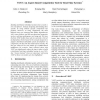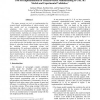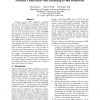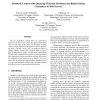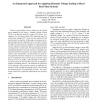143
click to vote
RTAS
2003
IEEE
15 years 7 months ago
2003
IEEE
Most research on QoS-aware computing considers systems where code is generally partitioned into separately schedulable tasks with associated timing constraints. In sharp contrast ...
158
click to vote
RTAS
2003
IEEE
15 years 7 months ago
2003
IEEE
Building distributed embedded systems from scratch is not cost-effective. Instead, designing and building these systems by using domain specific components has promise. However, i...
127
click to vote
RTAS
2003
IEEE
15 years 7 months ago
2003
IEEE
This paper addresses the scheduling problem of radar dwells in multi-function phase array radars. Well-known and new challenges make it difficult to provide predictable performan...
135
click to vote
RTAS
2003
IEEE
15 years 7 months ago
2003
IEEE
A reward-based task typically consists of a mandatory part that must be accomplished before the given deadline, and an optional part that is associated with rewards for partial co...
131
click to vote
RTAS
2003
IEEE
15 years 7 months ago
2003
IEEE
This paper presents our tool set implementation for scenario-based multithreading of object-oriented realtime models and an accompanying experimental validation. Our tools enable ...
118
click to vote
RTAS
2003
IEEE
15 years 7 months ago
2003
IEEE
In this work, we first present an application-initiated strategy that aims to control the energy consumption, while simultaneously enhancing the performance of a heterogeneous emb...
142
click to vote
RTAS
2003
IEEE
15 years 7 months ago
2003
IEEE
Existing real-time ORB middleware standards such as RT-CORBA do not adequately address the challenges of 1) providing robust performance guarantees portably across different platf...
147
click to vote
RTAS
2003
IEEE
15 years 7 months ago
2003
IEEE
The use of feedback control theory for performance guarantees in QoS-aware systems has gained much attention in recent years. In this paper, we investigate merging, within a singl...
119
click to vote
RTAS
2003
IEEE
15 years 7 months ago
2003
IEEE
This paper presents a novel approach for calculating a probabilistic worst-case response-time for messages in the Controller Area Network (CAN). CAN uses a bit-stuffing mechanism...
148
click to vote
RTAS
2003
IEEE
15 years 7 months ago
2003
IEEE
Wireless and portable devices depend on the limited power supplied by the battery. Dynamic Voltage Scaling (DVS) is an effective method to reduce CPU power consumption. For real-t...

